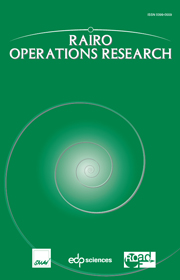No CrossRef data available.
Article contents
A short note on marginal analysisof a transportation problem (Retraction article)
Published online by Cambridge University Press: 08 October 2009
Abstract
Editorial from the Editor-in-Chief regarding this case of plagiarism
Philippe Mahey
1 Introduction
Plagiarismis a plague that any scientific publication in any discipline should fight anderadicate all over the world. Unfortunately, if, on the one hand, the powerfulsearch engines available on the web have helped referees to identify most ofthe cases, the increasing number of publications have on the other handfacilitated that dubious practice and the number of cases have increased. The case we are facing today in our journal is a severe one as the "authors" aremulti-recidivists who have been identified in former plagiarized papers since 2007. M. Sreenivas and T.Srinivas have this time succeeded in obtaining the publication of a plagiarizedpaper in the last issue of the RAIRO journal, but their fraud has beenidentified very quickly by different colleagues.We will briefly recall below the history of former cases involving these two persons andexpose the proofs of plagiarism about the current paper which justify itsretraction from the records of the journal.
2 A history of frauds
At leastfour papers co-authored by Sreenivas and Srinivas have been revealed in thelast two years and a report about this investigation has been published on theweb page of SIAM (http://www.siam.org/journals/plagiary/index.php).The method was nearly always the same as these papers contained entireparagraphs and abstracts copied almost verbatim from preprints or old papers inthe field (the Transportation area). We will only resume one of these factswhich is particularly instructive: as mentioned in the SIAM report, the paper: M. Sreenivasand T. Srinivas, Thetransportation: more-for-less criterion, International Journal ofStatistics and Management System, v. 3, n. 1–2, pp. 152–165,2008 is indeedplagiarized from S. Storøy: The transportation paradox revisited, postedto Optimization Online September 2007. Surprisingly, the same authors havesubmitted the same paper in parallel to the 4OR journal in october2007, but it was discovered to be plagiarized and was not published. Theeditors of that journal published an editorial in the first number of the 2009 volume(D. Bouyssou, S. Martello, F. Plastria, Plagiarismagain: Sreenivas and Srinivas, and an update on Marcu, 4OR vol. 7, n°1, 2009,pp. 17–20) with a transcription of the exchange mail between them and the authorswhere the latter did express some weak regrets without any furtherjustification. As said in the editorial, "this did not prevent them fromsubmitting their plagiarized text to another well-known OR journal, namely the European Journal of OperationsResearch "Unfortunatelyenough, the 4OR editorial was published too late to prevent the publication ofthe present paper in RAIRO.
3 The plagiarized paper
The appliedprocedure for this kind of plagiarism is always the same: select and copyparagraphs and sentences from textbooks or research reports, and finally mergethem in a personal form that is able to mislead the reader. The followingreferences prove that the paper "A short note on marginal analysis of atransportation problem", published in vol. 43, n°4, pp. 331–337, has beenalmost entirely plagiarized:
1. The entire abstract after the first sentence is a verbatim copy of a paragraph from "Deterministic modeling: linear optimization with applications", a set of course notes by Hossein Arsham. The paragraph in question can be found at:http://home.ubalt.edu/ntsbarsh/opre640a/partVIII.htm#rmarginalFactorPri
2. The first paragraph of the introduction is taken from course notes posted by Tim Yeager at http://sorrel.humboldt.edu/%7Eeconomic/econ104/marginal/
3. The second paragraph is taken verbatim from http://www.papercamp.com/essays/Decision-Making/3884.html
4. Section 2 is a verbatim copy from K. Murty well-known textbook: http://ioe.engin.umich.edu/people/fac/books/murty/opti_model/junior-6.pdf
5. The first illustration of section 3 is taken too from Murty’s book.
6. The first paragraph of the conclusion comes from the same source as the introduction.
7. None of the references are actually referred to in the paper.
We haveasked the authors of the plagiarism to explain the situation and defendthemselves. Their answer was that they found normal to refer to other researchpapers to present the concepts. They add that "A small misunderstanding is thatthe sources of the taken matter are not mentioned in the article. It neverrepeat again". We understand in theirpoor defence that they plead guilty and promise to stop plagiarizing, but thelong history of frauds we have reported above shows that we cannot trust themand must ban them from publishing in RAIRO.
4 Conclusion
We hopethat the plagiarism activities of Sreenivas and Srinivas will now definitivelystop. The above plagiarized paper will be retracted from the electronic recordsof the RAIRO Journal. They are now banned from publishing in an internationalOR journal for the second time and their former attempts are now wellreferenced and diffused so that the whole community, from Transportation,Operations Research and Applied Mathematics areas, will have the right tools tofoil their future submissions if any.
Acknowledgements : We thank heartily the former editors of 4OR, Denis Bouyssou, Silvano Martello and Frank Plastria for identifying the plagiarism, and Douglas Arnold, President of SIAM, for his help and advice in dealing with the present plagiarism.
Information
- Type
- Retraction article
- Information
- Copyright
- © EDP Sciences, ROADEF, SMAI, 2009

